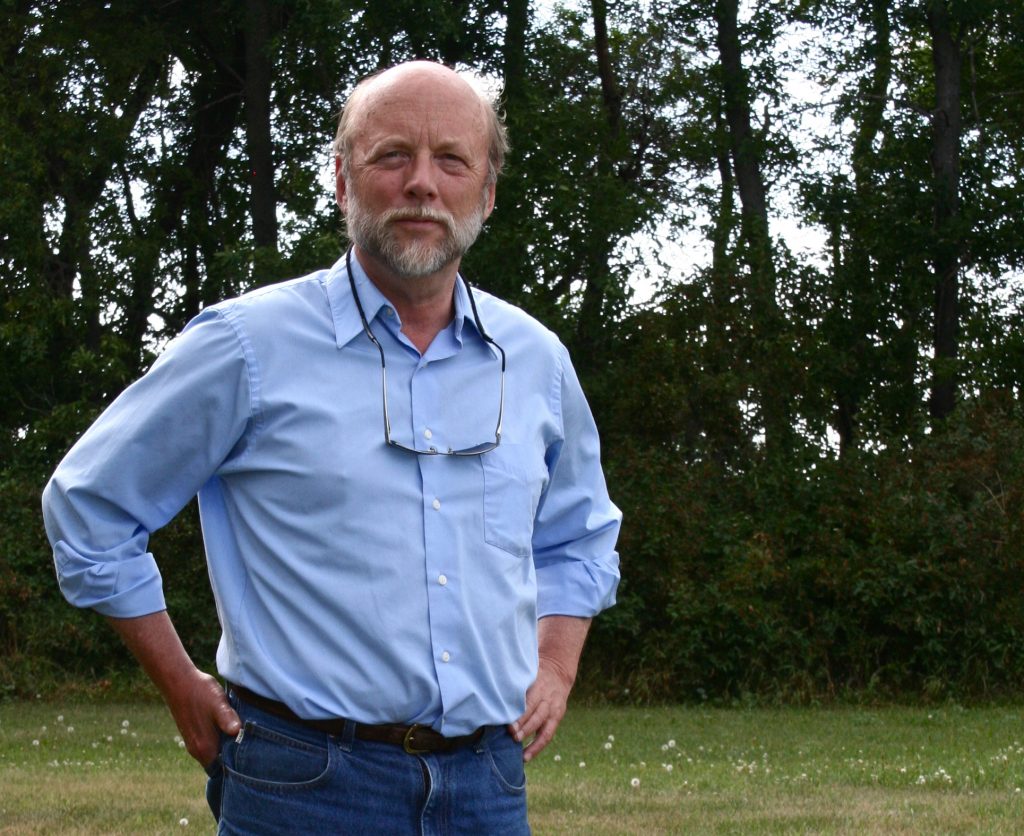As Marie Curie said, “Nothing in life is to be feared, it is only to be understood. Now is the time to understand more, so that we may fear less.”
In a new course called The Human Epoch: Living in the Anthropocene (GSCI 1000E), UConn geoscience professor Robert Thorson is hoping to convey key concepts across the liberal arts spectrum to curb anxiety about rapidly changing climate, and what the future may hold.
The Human Epoch
What is the Anthropocene? As of May 2019, an interdisciplinary international committee recommended it be the official designation of the current geological epoch, a standard term for describing planetary history, like the Pleistocene Epoch that came before the current period. Final approvals and the details and formalizing of the definition are still being worked out, Thorson says.
The term is not new, having been coined about 20 years ago. “Anthropocene” comes from the prefix “anthro,” meaning human. Though climate has changed repeatedly across geological time, this new epoch is the first one in the earth’s history in which the earth’s climate has changed because human actions.
“We have a new epoch, a new normal relative to the geological past,” Thorson says. “Physically we are in the same world; chronologically we are not, certainly not since 1950.”
1950 was the start of what is often called the Great Acceleration, when changes in industrial development that have had huge impacts on the global systems started, says Thorson. 1950 is also likely to be the starting point for the Anthropocene Epoch. It was in this decade when phenomena like over-production and over-consumption of goods, and overuse of resources, especially fossil fuels, began rapidly raising the global temperature. As a result, Thorson says, we as a species have become the dominant geophysical force on the planet.
“The word ‘fossil’ is from the Latin root meaning ‘dug up,'” he says. “Fossil fuels are a carbon store and we are simply transferring carbon faster into the atmosphere than from it, and the Earth system is responding quickly and dramatically in various ways.”
In transferring this stored carbon from the ground, the atmosphere is becoming increasingly carbonized, which increases temperature around the world, leading to unpredictable effects on everything from storm systems to agriculture. Carbonizing the atmosphere is also contributing to ocean acidification, a process that is changing the geochemistry and ecology of the world’s oceans. These changes are happening more rapidly than at any point since human beings first evolved, which is why advocates favor the designation of the current period as the Anthropocene: the world is being remade by human activity.
Teaching about Living in the Anthropocene
These processes are already bringing vast changes to the world.
New terms are creeping into the headlines – “climate grief” and ‘“eco anxiety,” for example – as recognition of the scale and consequences of this change becomes more widespread.
However, Thorson is hopeful the new class will serve as a means of giving students a clearer handle on how the earth system works and what to expect in the near future. Having some knowledge of earth systems is important for understanding the problem, and ultimately Thorson hopes this knowledge will be reassuring.

“Geoscience tends to not be taught in high school curriculums since it is the sum total of biology, chemistry, and physics applied to the entire Earth system,” Thorson says.
In addition to addressing this deficit in geoscience education, the course will offer different perspectives on the Anthropocene. Ideas from faculty members from other academic disciplines will be included in the course, from disciplines ranging from ecology to anthropology to political science.
A Dualism to do Away With
Thorson says the fundamental problem is the idea of dualism between human beings and the environment. As long as humans conceive of nature as something separate from ourselves, it will be easy to discount the centrality of the environment to our existence.
“If it is your house, you can trash it or you can maintain it and keep up with it. Outside of your house, you have less opportunity and responsibility,” Thorson says. “So I would like to think the planet is now ours not in the sense of ownership but in a sense that it is us.”
The course will demonstrate the ways in which seemingly disparate parts of the environment are intimately connected. For instance, melting glaciers in Greenland result in sea level rise in Hawaii, says Thorson.
“We want to help students make these connections and get their arms around the climate crisis.”
The course is intended in part to ameliorate apocalyptic angst, demystify the earth system, and help students take planetary ownership not in a possessive way, but in a way that means feeling responsible for our collective future.
Despite the scope of the challenge facing us, Thorson says he is remaining positive and hopeful that The Human Epoch course will help put the details of the Anthropocene into a context students will find useful to face the future.
“My takeaway is that if humans are powerful enough to transform the globe in serious inadvertent ways, we are powerful enough to ameliorate and adapt to some of the changes,” he says.



